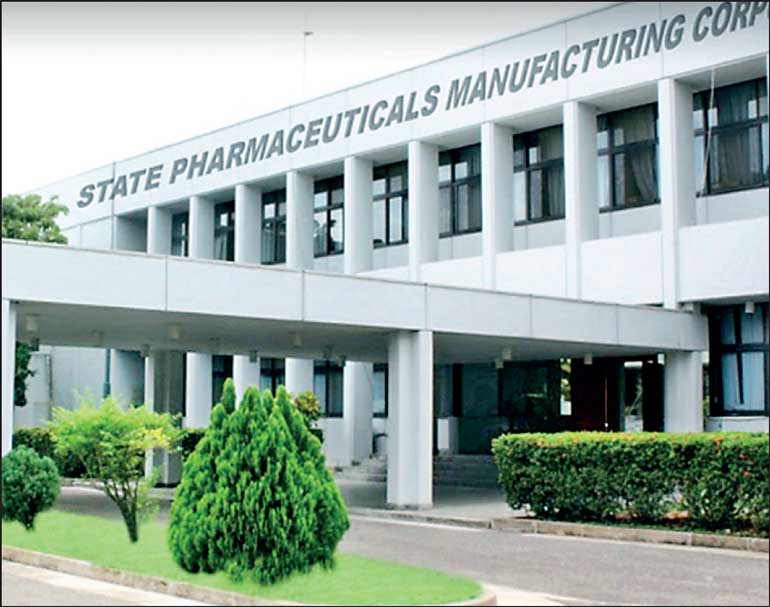Thursday Feb 19, 2026
Thursday Feb 19, 2026
Thursday, 9 December 2021 00:00 - - {{hitsCtrl.values.hits}}

Sri Lanka’s pharmaceutical sector has stepped up to the plate during the past two years working tirelessly to cater to the national demand for drugs in the midst of import restrictions compelled by the global pandemic.
The industry revival is a result of the Memorandum of Understanding followed by a Joint-Venture Agreement signed between State Pharmaceutical Manufacturing Corporation (SPMC) and the members of the National Chamber of Pharmaceutical Manufacturers of Sri Lanka (NCPM) in 2017.
At present, 15-20% of the total local drug requirement is fulfilled by SPMC, joint venture partners of SPMC – under strict adherence to quality standards stipulated by the SPMC and other homegrown manufacturers.
Pharmaceutical self-sufficiency falls in line with the national priority of retaining foreign currency in the country. Empowering local pharma is a win-win for all parties involved because it gives citizens better access to Government (SPMC) approved high quality medicine for affordable prices while generating occupational opportunities for local youth.
In order to achieve self-sustainability local industry would require FDIs which would in turn bring international technology and knowhow to Sri Lanka paving the way for the country to emerge as a ‘pharma hub’ capitalising on the country’s strategic location in the Indian Ocean.
The construction of three ‘pharma zones’ has already commenced in Anuradhapura, Hambantota and Millawa intending to attract such investments. The Millawa SPMC zone, largest of the three, is slated to house four state-of-the-art factories within it.
NCPM President Dr. Lohitha Samarawickrema in a letter to media dated 4 August however said that the biggest impediment for yielding the optimum benefit from this joint venture is misinformation. He went on to say that contradictory reports create a sense of anxiety among the Sri Lankan public as well as demotivate potential local and foreign investors.
According to NCPM President, up to 80-85% of the local production catering to ~15% of the total demand is supplied by SPMC joint venture stakeholders. The stakeholders collectively manufacture over 300 varieties of drugs which are then quality-tested and distributed through the state manufacturer (SPMC). He said the success of this Public-Private Partnership could augur well for the country’s economy as well as the general wellbeing of citizens and thus should not be stigmatised without a fair assessment.
Given the strategic location of Sri Lanka, Dr. Samarawickrema went on to add that Sri Lanka was being seriously considered to be developed as a hub for vaccine manufacturing with Asian and African markets in mind. In that regard, a feasibility study is already underway to establish a vaccine manufacturing enterprise as a joint venture between Sri Lanka’s Kelun Life Sciences and China’s Sinovac Biotech Ltd. The local partner of this venture is the first homegrown manufacturer of saline and is credited with propelling Sri Lanka to full self-sufficiency in same.
It has been reported that since the beginning of COVID-19, 200 new vaccine manufacturers have joined the production pipeline. The United States of America, Canada, Brazil and Mexico are considered the top vaccine manufacturers while some Latin American countries are among the Top 20 ranked vaccine manufacturers with self-sufficiency up to about 72%.
This NCPM-SPMC venture is especially meaningful considering that it served to positively disrupt the state monopoly on pharmaceutical drugs thereby ushering in new possibilities and opportunities for private sector stakeholders for productive collaboration. The chamber firmly believes pharma industry’s initiative to work closely with the private sector sets a welcome precedent for other State sector enterprises, too, to follow suit.
Combining the State sector’s integrity and welfare-mindedness with the private sector’s efficiency and ingenuity can elevate the local pharma sector from self-sufficiency to unprecedented heights from a trade standpoint. Pharma has immense potential to become one of the top foreign revenue earners for Sri Lanka in the ensuing years with due patronage from the State.